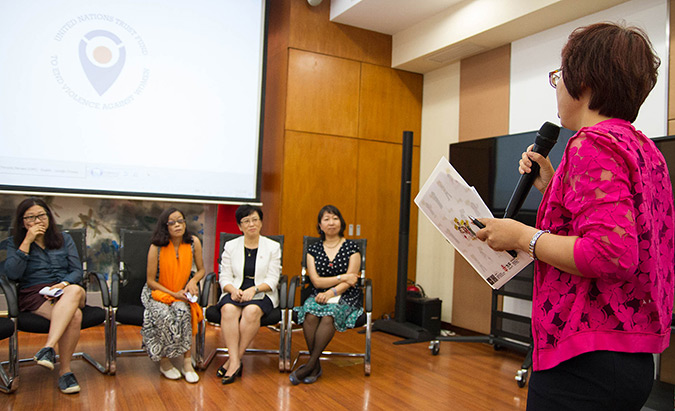Greater efforts needed to protect disadvantaged women from domestic violence, say experts at workshop co-organized by UN Women
Date:
Press Release
For immediate release
Beijing, China – Law enforcement authorities must strengthen efforts to protect China’s disadvantaged women from domestic violence, including women living with HIV, LBT people and those with disabilities.

Gender equality experts and advocates made this recommendation at a 09 August workshop in Beijing that UN Women co-organized with equality NGO (Weiping) and Women’s Network against AIDS-China. About 75 participants from United Nations and governmental agencies, research institutes and civil society organizations attended the workshop on “Implementation of the National Domestic Violence Law: From the Perspectives of Disadvantaged Women”.
UN Women China Country Programme Manager Julie Broussard told the workshop participants: “The United Nations Sustainable Development Agenda includes the clearly stated goal of eliminating all forms of violence against women, and recognizes that eliminating violence against women is a critical issue in promoting sustainable development. However, disadvantaged women such as women living with HIV, LBT, and women with disabilities are often more susceptible to violence and harm, and are more easily ignored. To achieve the goal of gender equality and women’s empowerment, stakeholders must pay close attention to disadvantaged groups, and speed up our action.”

The founder of Equality NGO, Feng Yuan, noted that China’s landmark National Domestic Violence law, in effect since March 2016, allowed state authorities to intervene in domestic violence that once was considered just “a household matter”. But she added that the authorities lacked comprehensive understanding of how to combat domestic violence and enforced the law passively.
Yuan Wenli, Secretary-General of Women’s Network against AIDS-China, said its nationwide survey of 457 people in 2016 found that about 48 per cent of women living with HIV had experienced at least one form of domestic violence, compared with about 25 per cent of other women. Physical and psychological violence, economic control and sexual violence are common forms of domestic violence. Sexual violence may also cause women to be infected with HIV, as sexual transmission has become the main mode of HIV transmission in China.
Li Yue from Rainbow Anti-Gender-Based Violence Service Center for LGBT presented the first research report related to domestic violence experienced by China’s LGBT – lesbian, gay, bisexual and transgender people. The center’s survey of 419 people nationwide in 2015 found that about 69 per cent of lesbian and bisexual women in China had experienced domestic violence. About 49 per cent of respondents also reported abuse by family members, and about 43 per cent of respondents reported abuse by same-sex partners.
Zhang Baolin, Chairperson of China Association for Persons with Intellectual Disability and their Relatives, referred to the United Nations Convention on the Rights of Persons with Disabilities, which recognized the greater risk of violence and harm that women and girls with disabilities face at home and outside of home. He said that women with mental disabilities in particular have experienced sexual violence.
Workshop participants agreed that domestic violence worsened the plight of disadvantaged women who already faced gender inequality and social stigma and discrimination. They said the problem must be addressed by strengthening policies and laws, working with local communities and domestic violence victims, and especially, raising awareness among policymakers and the general public.
Media Inquiries
Liu Mingming
Communications Associate
UN Women China
Tel: 10-85326687
Email: [ Click to reveal ]
About UN Women
UN Women is the United Nations organization dedicated to gender equality and the empowerment of women. A global champion for women and girls, the organization was established in 2010 to accelerate progress on women’s rights worldwide. UN Women’s efforts are based on the fundamental belief that every woman has the right to live a life free from violence, poverty, and discrimination, and that gender equality is a prerequisite to achieving global development.
http://china.unwomen.org | cedaw-in-action.org
Twitter| Facebook @unwomenasia